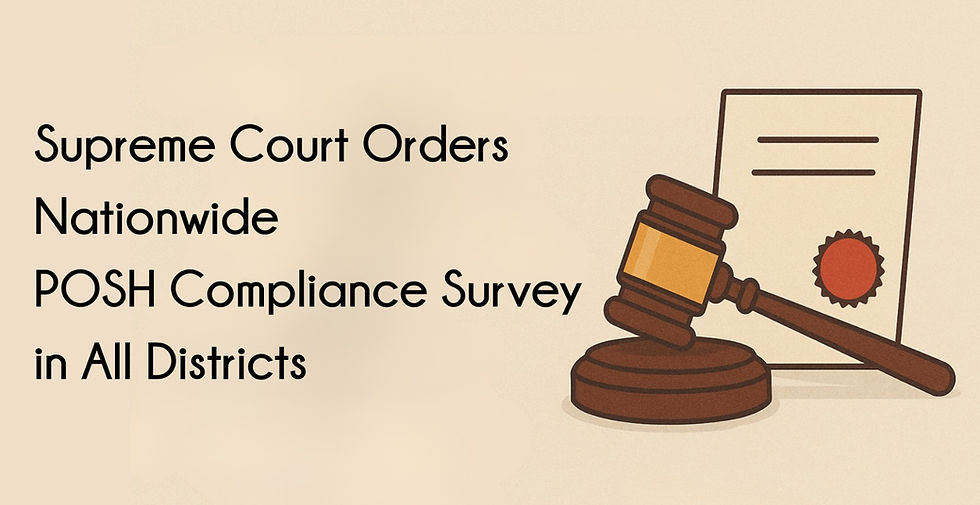Strengthening POSH Compliance in Hospitals & Healthcare: A Guide for HR Leaders
- LexPOSH

- Mar 17
- 3 min read

The Need for Strong POSH Compliance in Hospitals & Healthcare
Hospitals and healthcare institutions operate in high-pressure environments where professionals interact closely with patients, their families, and colleagues. The nature of healthcare work - long shifts, patient care responsibilities, emergency situations, and hierarchical structures - makes it essential to foster a safe and respectful workplace. Unlike corporate settings, hospitals have a diverse workforce, including doctors, nurses, administrative staff, technicians, security personnel, and outsourced workers. Ensuring compliance with the Prevention of Sexual Harassment (POSH) Act is not just a legal requirement but a necessity to protect employees, maintain ethical standards, and enhance trust in the institution.
Key Challenges in Implementing POSH in Hospitals & Healthcare
Patient-Centric Environment: Harassment incidents may involve not just colleagues but also patients, their relatives, and visitors, making redressal mechanisms complex.
Hierarchical Workplace Structure: Senior doctors, consultants, and administrators hold significant authority, often discouraging junior staff from reporting misconduct due to fear of career repercussions.
Long Shifts & Close-Contact Work: Healthcare professionals work in high-stress, long-hour environments, sometimes leading to blurred professional boundaries.
Multiple Stakeholders & Outsourced Staff: Hospitals rely on third-party workers like security guards, cleaning staff, and ambulance drivers, who may not always be covered under internal policies.
Cultural & Gender Diversity in Workforce: Hospitals employ individuals from diverse backgrounds, and cultural differences may influence perceptions of workplace behavior and harassment.
Reluctance to Report Due to Reputation Concerns: Employees may fear that reporting a complaint will lead to stigma, especially in close-knit medical communities.
Emergency & Critical Care Situations: The priority in hospitals is patient care, which sometimes results in workplace misconduct being overlooked or deprioritized.
7 Steps to Strengthen POSH Compliance in Hospitals & Healthcare
1. Establish Clear POSH Guidelines Specific to Healthcare
Develop a POSH policy that covers not only employee interactions but also harassment from patients, visitors, and vendors.
Clearly define acceptable and unacceptable behaviors in the context of hospital duties.
Ensure that all staff, including contract workers, are aware of the redressal mechanisms.
Display POSH-related information in multiple areas such as staff rooms, duty stations, and hospital notice boards.
2. Implement Comprehensive Training & Sensitization Programs
Conduct role-specific training - separate sessions for doctors, nurses, administrative staff, and support personnel.
Educate employees on handling patient-related harassment cases, ensuring ethical and legal compliance.
Use real-life case studies from healthcare settings to make training relatable. Incorporate POSH training into new employee induction, especially for junior doctors and nursing staff.
Provide training in local languages to ensure better understanding across diverse staff groups.
3. Set Up Multiple Reporting Channels for Confidentiality
Establish dedicated helplines, email support, and drop-boxes for employees to report complaints anonymously.
rain hospital administrators to handle complaints discreetly, ensuring that victims feel safe to come forward.
Designate POSH champions (trained personnel) across different hospital departments to assist in reporting.
Encourage peer support networks where employees can seek guidance before officially filing a complaint.
4. Strengthen the Internal Committee (IC) for Fair Investigations
Appoint IC members with experience in handling sensitive cases with empathy and legal precision.
Conduct mock IC proceedings to build committee members' confidence in resolving complaints effectively.
Include an external POSH consultant for unbiased investigations, especially in cases involving senior personnel.
Maintain detailed documentation to ensure legal compliance and transparency in case handling.
5. Integrate POSH Awareness into Hospital Culture
Leadership—hospital directors, senior doctors, and HR heads—must actively advocate for zero tolerance toward harassment.
Organize regular town hall meetings where staff can discuss workplace concerns.
Use posters, newsletters, and internal apps to keep employees informed about their rights and reporting mechanisms.
Include POSH compliance as a performance metric for senior leadership, ensuring accountability at all levels.
6. Ensure POSH Compliance for Third-Party Workers & Vendors
Mandate POSH clauses in contracts with security agencies, cleaning service providers, and ambulance operators.
Extend POSH training to outsourced staff, ensuring they understand the workplace code of conduct.
Establish a joint reporting system where third-party workers can also report harassment cases without fear.
Conduct regular compliance checks with vendors to ensure adherence to POSH regulations.
7. Conduct Regular Audits & Gather Employee Feedback
Perform POSH audits annually to assess compliance effectiveness and identify gaps.
Distribute anonymous employee surveys to understand the perception of workplace safety.
Organize focus group discussions to encourage employees to share feedback on harassment-related concerns.
Implement corrective measures based on audit findings to continuously improve policies.
Building a Safe & Respectful Healthcare Workplace
Hospitals and healthcare institutions must go beyond legal compliance and proactively foster a culture of safety, dignity, and respect. A strong POSH framework ensures a secure working environment for all employees, enhances institutional credibility, and ultimately leads to better patient care. By prioritizing awareness, reporting, and enforcement, HR leaders can create a healthcare workplace where every employee feels protected and empowered.




